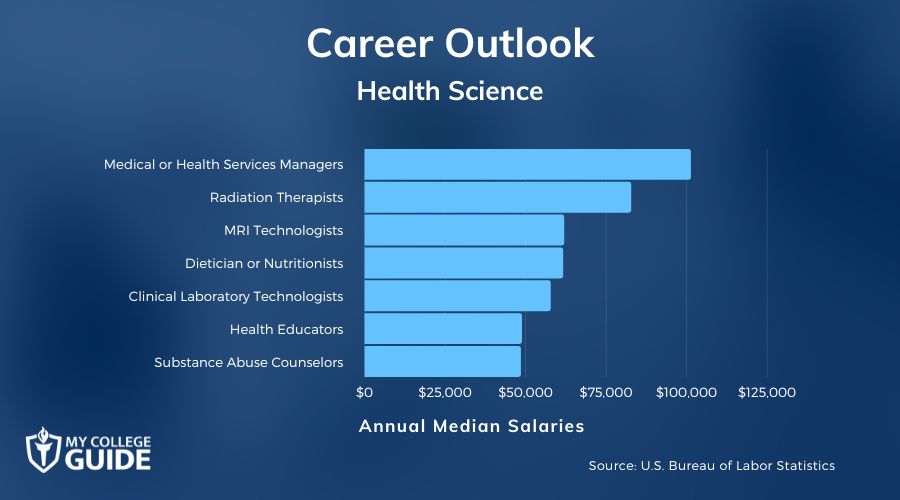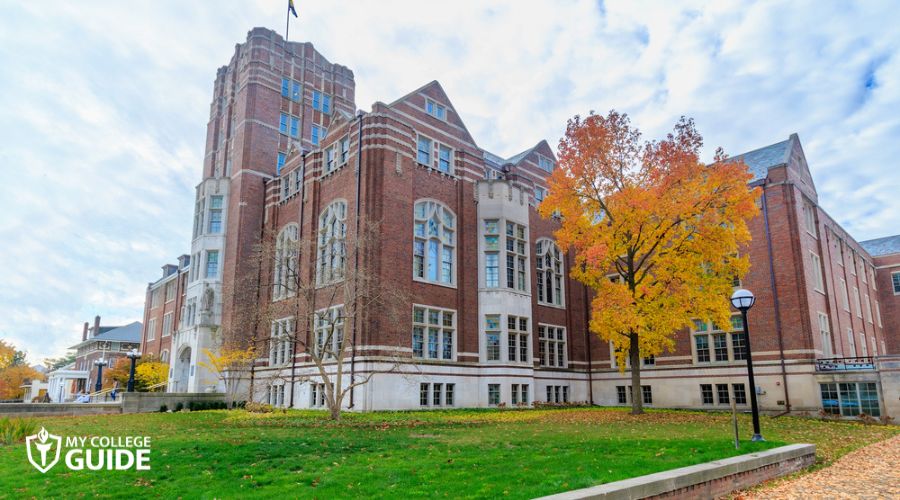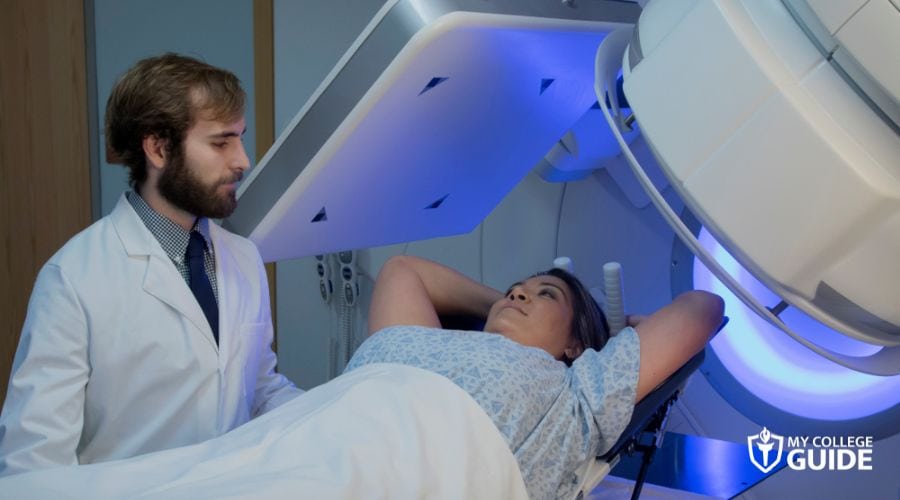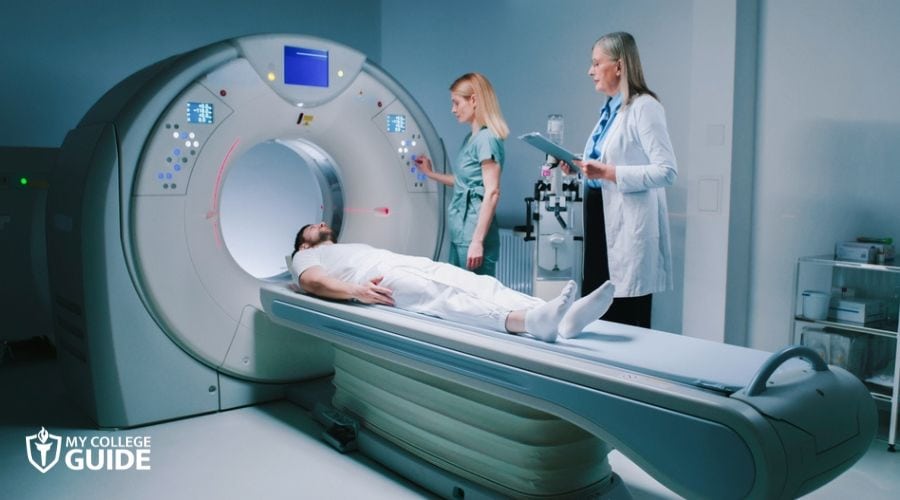Online health science degrees can be ideal for those interested in advancing and enhancing public health, whether it’s in a clinical, managerial, or administrative role.

Opting to complete your degree online can offer flexibility and possible cost savings.
Editorial Listing ShortCode:
This highly versatile degree can open doors to a number of well-paying careers in one of the fastest-growing fields out there.
Online Bachelor’s in Health Science Degrees

Health science is where science meets healthcare. There are two parts to this field: the study and research of human or animal health, and the application of that knowledge.
An online health science degree sometimes called an allied health degree, is very broad and covers a variety of subjects, such as chemistry, biology, ethics, management, and medical terminology. This multidisciplinary approach can lead to a number of different careers or can serve as a stepping stone to a graduate program.
Editorial Listing ShortCode:
If this is a degree you are considering, it’s important to research programs and find one with health science classes that closely align with your career goals. While the degree in and of itself is quite versatile, you will find that some programs emphasize clinical health, while others prepare students for administrative roles.
Health science classes vary from institution to institution and are designed to provide the general knowledge and skills needed in a variety of healthcare settings. This foundation will allow you to explore a variety of options before settling on an area of specialization.
Examples of courses you may take include:
- Epidemiology
- Evidence-based research methods
- Financial management in healthcare
- Health communications
- Information technology applications
- Legal and ethical considerations in the health environment
- Management of health professionals
- Medical terminology
- Principles of public health
Many baccalaureate programs will allow you to choose an area of specialization and focus your final 2 years of study on that particular area of healthcare.
Common Types of Health Science Programs

When people refer to a health science degree, they are generally talking about a bachelor’s level degree, but there are other degree levels available in this field.
- Certificate in Health Science: If you’re not ready to commit to a full degree program, or if you have been in the workforce but need to brush up on some specific skills, an entry-level certificate may be a good solution. Graduate certificates can also prepare seasoned professionals to transition into managerial roles.
- Associate’s in Health Science: An associate degree is a step above a certificate program and may be enough to pursue entry-level positions in administration, health informatics, health science writing, and technical work in laboratories.
- Bachelor’s in Health Science: This degree is perhaps the most versatile, allowing you to move directly into an advanced healthcare career (including leadership roles), preparing you for graduate studies, or even launching you into a nursing career.
- Masters in Health Science: At this level, you will dig deep into clinical and nonclinical education, research, and data analysis. Though candidates with a bachelor’s can pursue leadership roles, this degree will help set you apart, especially in highly specialized fields.
- Doctor in Health Science: This post-professional degree is for individuals who want to secure advanced leadership or teaching positions. Coursework will focus on education, research, and administration or practice.
It can be helpful to consider your long-term career goals when choosing the right degree program for you.
Common Online BS in Health Science Concentrations

While earning degrees online in health science, you will learn about the legal and ethical aspects of healthcare, public policy, medical terminology, and the US healthcare system.
You will also take courses that prepare you for managerial roles. Often, health science programs will allow you to select an area of concentration. The options might include:
- Biomedical Science: With this concentration, you will take courses that prepare you to work in laboratories, developing treatments, technology, and medical devices that will aid patients.
- Child Health: This concentration focuses on various child health programs to help you understand a child’s development, mental, social, and behavioral health, the various issues associated with children, and how to treat the child’s overall well-being.
- Health Care Administration: Healthcare administration spans a wide field as you learn about information services, operations, health policy, and more. This degree concentration helps prepare you to work in a medical office setting.
- Public Health: Public health focuses on the education of physicians and patients and how to communicate the policy effectively. This can include becoming a technical medical writer or possibly a public relations specialist.
- Radiography: A radiography concentration allows you to work with physics, math, and science to use radiation and magnetism to diagnose patients through computers and imaging.
If you choose a specialization during your bachelor’s degree program, a bulk of your health science classes during your final two years will be in that area of study.
Health Science Careers and Salaries

The healthcare field is expansive and allows for a lot of room to grow professionally. Let’s look more closely at a few professions you could pursue with an undergraduate degree in health science according to data obtained by the U.S. Bureau of Labor Statistics (BLS):
| Careers | Annual Median Salary |
| Medical or Health Services Managers | $101,340 |
| Radiation Therapists | $82,790 |
| MRI Technologists | $61,980 |
| Dietician or Nutritionists | $61,650 |
| Clinical Laboratory Technologists | $57,800 |
| Health Educators | $48,860 |
| Substance Abuse Counselors | $48,520 |
| Medical Records and Health Information Technicians | $45,620 |
| Medical Assistants | $37,190 |
The BLS states that employment in healthcare occupations is projected to grow 13% within the next 10 years. If you’re interested in working directly with patients and their dietary needs, you may want to consider becoming a dietician, which is expected to see a 7% growth over the next decade.
Editorial Listing ShortCode:
If you prefer working with imaging and technology, perhaps a career in the imaging field would best suit you. Radiologic and MRI technologists are projected to grow 6% over the same time period. Please keep in mind that some employers look for a minimum of a bachelor’s degree to be considered for a few positions.
Health Science Bachelor’s Curriculum & Courses

Your curriculum in a Bachelor of Health Science online degree may vary, but you may encounter courses like the ones listed below.
- Physics for Allied Health: You’ll learn about physics as it applies to health care, which includes subjects like momentum, thermodynamics, and gravity.
- Values, Ethics, and Conflict Resolution in Health and Urban Affairs: This course teaches students about how the values of people and organizations in the healthcare world can affect patients.
- Cultural Competency in Health Sciences: You’ll learn about a wide variety of cultural beliefs about health from different cultures all over the world.
- Pharmacology for Health Sciences: This class covers different pharmacologic substances and how they can be used effectively to help patients.
- Nutrition and Exercise: You’ll learn about the foundational elements of nutrition, and how proper nutrition and exercise can contribute to physical wellbeing.
- Communication Theory and Practice for Health Professionals: This course dives into crucial tactics for communication between health professionals, patients, and patients’ family members.
- Musculoskeletal Anatomy for DL: You’ll learn about different aspects of the body’s muscles, including basic palpation and nerve supply.
- Motor Learning and Movement Control: This class covers different aspects of human movement, including relevant terminology, movement control methods, and neuromuscular performance.
- Communication and Information Technology for Healthcare Professionals: You’ll learn various Internet and technology skills that may be able to help you in a healthcare setting.
- Healthcare Quality Management: This course will show students methods for evaluating and maintaining quality healthcare, including operations and inventory management.
In addition to courses like these, your bachelor’s in health science degree online may offer opportunities for internships, fieldwork, or one-on-one mentorship.
How to Choose an Online Bachelors Degree in Health Science Program

Before choosing a health science bachelor degree online, it’s a strategic move to investigate a variety of different factors about the program and school. This may help equip you to choose a degree program that aligns with your priorities. Some variables to consider are listed below.
- Tuition cost
- Accreditation status
- Concentration options
- Online vs. in-person learning format
- Program length
- Financial aid contributions
- Campus location
- Internship opportunities
- Curriculum
- Classroom size
You may want to look at what concentration options your potential school has, to see if they can help you prepare to pursue your chosen career path after graduation. For example, if you aspire to one day become a medical and health services manager, you may want to find a school that offers a health care administration concentration.
Health Sciences Major Admissions Requirements

The admissions requirements for a health science bachelor degree online may vary by school, but here are a few common ones.
- High school diploma
- SAT or ACT scores (only some schools require them)
- Letters of recommendation
- Personal essay
In addition to these requirements, some schools may want to see your high school transcripts. If they have a minimum GPA requirement for admission, they can check this on your transcript and verify that you have taken any necessary relevant coursework.
Online Health Science Degrees Accreditation

When selecting a school for a health sciences degree, it’s important to take regional accreditation into consideration. This status means that a third-party accrediting organization has evaluated the school and verified that it meets standards for academic quality.
This status can be important if you are looking to apply for federal financial aid, since qualifying students can typically only receive assistance if they’re attending a regionally accredited school. Also, employers may check for this on your resume.
Editorial Listing ShortCode:
To learn more about regional accreditation, visit the U.S. Department of Education website.
Financial Aid and Scholarships

If you’re interested in applying for financial aid, you can check out all the different options on the Federal Student Aid website. You can explore various types of loans, scholarships, grants, work-study programs, and more.
The website also offers loan entrance counseling to help you fully understand how your loan works if you qualify for one. To qualify as an undergraduate student for loan counseling, you must be enrolled in an undergraduate program that lasts for four years or less.
Your program will also need to result in an undergraduate degree or certificate. Undergraduate students may be able to apply for direct subsidized and unsubsidized loans.
Health Science Professional Organizations

While enrolled in a bachelor’s degree in health science, you may want to look into joining a professional organization. Below are a few major organizations in the field.
- American College of Healthcare Executives (ACHE)
- American Health Information Management Association (AHIMA)
- American Public Health Association (APHA)
Associations like these can be a valuable resource. You may meet professionals in the field, establish connections, and learn more about what it’s like to work in this industry. You may also find opportunities for internships and fellowships, along with other resources.
Is Health Science a Good Major?

Yes, health science is a good major for many undergraduate students. Since you’ll primarily be learning about all the different ways you can help patients in the healthcare field, this major can be a very rewarding option.
Editorial Listing ShortCode:
The Bureau of Labor Statistics projects that several roles associated with health science will grow faster than average over the next few years. Athletic trainers are expected to grow by 17% and medical and health services managers by a whopping 28%.
Is Health Science a Hard Major?

The difficulty of your classes depends on a few different factors, including your school and professors. You may take classes that cover the technical aspects of human anatomy, such as Musculoskeletal Anatomy for DL, and learn about nutrition, physics, and human movement.
You may also take courses that cover the administrative and cultural aspects of working in healthcare. These can include Cultural Competency in Health Sciences, Communication Theory and Practice for Healthcare Professionals, and Healthcare Quality Management.
Is Health Science a Good Pre Med Major?

Heath science can be pre-med, but it does not have to be. Technically any major can be pre-med; students of any major simply need to complete certain required courses to apply to medical school. But some majors are more popular choices for those pursuing a medical degree.
Editorial Listing ShortCode:
According to data from the Association of American Medical Colleges, a specialized health sciences degree was one of the most common types of undergraduate degrees earned before starting medical school. However, an online health science degree can also lead to many other careers, on its own or with additional education.
Can You Become a Nurse With a Health Science Degree?

A health science degree alone is not enough to become a nurse, but it can be used as a stepping stone. If you are going to college for the first time and know you want to go into nursing, it’s best to take a direct path by enrolling in an accredited nursing program, taking the appropriate exams, and becoming licensed in your state.
But if you already have a health science degree, you can transition into nursing with an accelerated nursing program or second-degree nursing program. This will allow you to earn a bachelor’s degree in nursing (BSN) in 11 to 18 months of full-time study.
What Can You Do With a Health Science Degree?

An online health science degree will prepare you for exciting careers in the clinical, public, or administrative sectors of healthcare, or to pursue more advanced education.
Some careers you may pursue with an undergraduate degree in health science include:
- Clinical Laboratory Technologist
- Dietician or Nutritionist
- Health Educator /Community Health Worker
- Medical Assistant
- Medical Records and Health Information Technician
- Medical or Health Services Manager
- Radiation Therapist
- Radiologic and MRI Technologist
- Substance Abuse, Behavioral Disorder, or Mental Health Counselor
Please keep in mind that additional certification or licensure may also be required for these positions. Some students use their health science undergraduate degree as a stepping stone and later pursue graduate studies or medical school.
How Long Does It Take to Get a Bachelor’s Degree in Health Science Online?

The timeframe for completing an online bachelor’s in health science depends on a few different factors, including your school’s semester length and your attendance status.
If your program follows a 16-week semester and you attend classes full-time, it typically takes four years to graduate with a bachelor’s degree. If your program follows an 8-week semester, you may be able to graduate in less time. If you stay enrolled year-round, including taking summer classes, you may also be able to finish in less time.
What Jobs Can You Get With a Health Science Degree?

The jobs you can land with a health science degree can vary based on your education, skillset, training, and more. Graduates tend to pursue careers in the healthcare field.
Editorial Listing ShortCode:
Professionals in this industry may work as medical and health services managers, where they may oversee healthcare organizations and supervise operations. They also work as athletic trainers, where they can help provide emergency care and rehabilitation for athletes. Professionals may also hold jobs as recreational therapists, dietitians, and health education specialists.
What’s the Difference Between a Bachelor in Health Science vs. Exercise Science?

While there is plenty of overlap between health science and exercise science degrees, there are a few key differences between the two types.
Bachelors in Health Science programs may cover:
- Nutrition
- Human anatomy
- Physiology
While Bachelors in Exercise Science programs may cover:
- Body movement
- Sports nutrition
- Training
In general, exercise science degrees cover specifics related to exercise and how it affects the body. Health science degrees are typically broader, studying human health as a whole.
What’s the Difference Between Public Health vs. Health Science Majors?

Public health and health science majors both study topics in the healthcare arena, but these degrees have a few major differences.
A Public Health Major may study:
- Environmental health
- Chronic disease
- Epidemiology
While a Health Science Major may study:
- Medical billing and coding
- Individual patient care
- Healthcare law and ethics
Overall, public health majors study the broader implications of health issues on the population, while health science majors learn how to make an impact on the lives of individuals or the success of an organization.
Is an Online Bachelor Degree in Health Science Worth It?

Yes, an online bachelor degree in health science is worth it for many students. According to the Bureau of Labor Statistics, jobs associated with health science, such as medical and health services managers and athletic trainers, will grow faster than average over the next ten years.
Editorial Listing ShortCode:
If you want to work in the healthcare field but don’t want to be a doctor, you may find that bachelors degrees in health science help open a wide range of job prospects. You may learn about topics that can help you pursue a career as a nutritionist, recreational therapist, and more.
Universities Offering Online Bachelors in Health Science Degree Programs
Methodology: The following school list is in alphabetical order. To be included, a college or university must be regionally accredited and offer degree programs online or in a hybrid format.

American Public University offers a BAS in Health Sciences that can be earned entirely online. Up to 90 qualifying credits may be transferred in toward the program’s 120 credits. Courses are 8 to 16 weeks long, and there are monthly start dates offered. The program is completed with a Senior Seminar in Health Sciences.
American Public University is accredited by the Higher Learning Commission.

Arizona State University offers a BS in Health Sciences through an entirely online program. The program requires the completion of 40 classes for a total of 120 credit hours and provides the option to complete an internship. Courses are 7.5 weeks long, and there are multiple start dates offered each year.
Arizona State University is accredited by the Higher Learning Commission.

Bellevue University offers a BS in Health Sciences that can be earned fully online. A pre-medical certificate may also be earned by taking specific courses on campus. The program requires the completion of 127 credits. Courses follow a quarter-semester schedule, with four start dates each year. Courses include Nutrition for Healthy Living, Understanding Health Research, and Medical Ethics and Leadership.
Bellevue University is accredited by the Higher Learning Commission.

College Choice ranked Florida Gulf Coast University’s health science program as one of the best in the nation. FGCU offers a BS in Health Sciences. All upper-level courses can be completed online. The program is designed for students who already hold an associate degree in a related field. Courses follow a semester schedule.
FGCU is accredited by the Southern Association of Colleges and Schools Commission on Colleges.

George Washington University offers a BS in Health Sciences through a fully online program. Concentration options include Global Leadership in Disaster Response, Medical Laboratory Science, and Biomedical Informatics.
Most concentration options require the completion of 120 credit hours. Some programs are restricted to only military members. Most concentrations require students to have transferrable general education credits.
GW is accredited by the Middle States Commission on Higher Education.

Liberty University offers a BS in Health Sciences that can be completed entirely online. Up to 75% percent of the program’s 120 required credit hours may be transferred in. Courses are 8 weeks long, and there are eight start dates offered each year. The program can typically be completed in 3.5 years.
Liberty University is accredited by the Southern Association of Colleges and Schools Commission on Colleges.

Nicholls State University offers a BS in Health Sciences with two tracks to choose from: Preprofessional or Health and Wellness. Both tracks may be completed fully online. The program requires the completion of 120 credit hours. Courses are taken in an 8 week, accelerated format, and there are multiple start dates offered each year. Most courses are asynchronous.
Nicholls State University is accredited by the Southern Association of Colleges and Schools Commission on Colleges.

Northern Arizona University offers a BS in Health Sciences with an emphasis in Public Health. Most courses are online, but a few courses are taken in a blended format. Fieldwork experiences are required. The program requires the completion of at least 120 credit hours. Courses follow a regular semester schedule.
Northern Arizona University is accredited by the Higher Learning Commission.

Northwestern State University of Louisiana offers a BAS in Allied Health. The program is entirely online and designed for working students.
General education credits and up to 30 hours of clinical experience may be transferred in toward the degree’s requirements. The program offers the choice of two concentrations: Health Science Leadership and Management or Health Science and Technology. Some courses are 8 weeks long, while others are 16 weeks long.
The Northwestern State University of Louisiana is accredited by the Southern Association of Colleges and Schools Commission on Colleges.

Nova Southeastern University offers a Bachelor’s in Health Sciences. All coursework is online, but the program does offer internship opportunities. The program requires the completion of at least 120 semester hours. There are three concentrations to choose from: Generalist, Occupational Therapy, or Healthcare Administration. Some courses are available in an accelerated format.
NSU is accredited by the Southern Association of Colleges and Schools Commission on Colleges.

Ohio State University offers a BS in Health Sciences. The fully online program requires applicants to meet all general education requirements before entering the program. Students may be able to work toward an associate degree while completing the program. Courses follow a regular semester schedule, and students typically begin the program in the fall.
Ohio State University is accredited by the Higher Learning Commission.

Purdue University offers a BS in Health Science through Purdue University’s fully online program. Courses are 10 weeks long, with start dates at least once per month. The program requires the completion of 180 quarter credits. It can typically be completed in 4 years when attended full-time.
Purdue University is accredited by The Higher Learning Commission of the North Central Association of Colleges and Schools.

College Factual ranked Rutgers University as one of the best schools in the country for health sciences degrees. Rutgers offers a BS in Health Sciences that can be earned fully online. The program is designed for degree completion, and applicants are required to already have an associate degree. Most courses are 15 weeks long, but a few courses are only 8 weeks long.
Rutgers is accredited by the Middle States Commission on Higher Education.

Southern New Hampshire University offers a BS in Health Science. The program is entirely online, and courses are taken in an asynchronous format. Applicants are required to have an associate degree in allied health. The program requires the completion of 120 credits. Courses are 8 weeks long, and there are six start dates offered each year.
SNHU is accredited by the New England Commission of Higher Education, Inc.

The University of Missouri offers a Bachelor’s in Health Science. Coursework can be completed online, but the completion of an internship is required. Courses follow a regular semester schedule. The program offers four emphasis areas to choose from: Rehabilitation Science, Leadership and Policy, Pre-professional, or Health and Wellness. The completion of 120 credit hours is required to graduate.
The University of Missouri is accredited by the Higher Learning Commission.

The University of South Dakota offers a BS in Health Sciences. Coursework may be completed on campus or online, but the program does require the completion of field experiences. The program requires the completion of 120 credit hours. Courses follow a regular semester schedule. The degree can be customized toward specific career goals through elective choices.
USD is accredited by the Higher Learning Commission.

Best Colleges ranked the University of West Florida as one of the best schools in the country for online bachelor’s degrees in health sciences. UWF offers a BS in Health Sciences that can be completed fully online. The program requires the completion of 120 credit hours. Courses are 8 weeks long, with multiple start dates offered each year.
The University of West Florida is accredited by the Southern Association of Colleges and Schools Commission on Colleges.

West Texas A&M University offers an online program that can be completed for a BA or a BS in Health Sciences. Optional on-campus courses are available. The program offers several focus areas, including Adolescent and Youth Health, Accounting and Finance, and Public Relations. Some courses are available in an 8 week, accelerated format.
West Texas A&M University is accredited by the Southern Association of Colleges and Schools Commission on Colleges.

Intelligent ranked West Virginia State University as one of the best schools in the country for online bachelor’s programs in health sciences. WVSU offers a BS in Health Science that can be completed fully online. The program offers two emphasis areas to choose from: Community Health Education or Leadership in Allied Health. The completion of 120 credit hours is required to graduate.
West Virginia State University is accredited by the Higher Learning Commission.

Western Kentucky University offers a BS in Health Sciences. The program offers three concentrations to choose from: Preparatory Health Sciences, Health Services Leadership and Management, or Allied Health. The Preparatory Health Sciences concentration is not available online, but some courses may be completed through distance education. The other two concentrations can be completed 100% online or on campus.
Western Kentucky University is accredited by the Southern Association of Colleges and Schools Commission on Colleges.
Getting Your Bachelor in Health Science Degree Online

If you aspire to work in the healthcare field one day, you may enjoy getting your bachelors in health science degree online. These programs typically help prepare students to pursue jobs like athletic trainers, health education specialists, registered nurses, and more.
You may get to study a wide range of topics, including the specifics of human anatomy and how muscles work. Your program may also offer classes in learning communication skills, the ethics surrounding medical care, and basic operations processes in a healthcare setting.
To get started toward your online bachelors in health science degree, try exploring accredited universities today.
